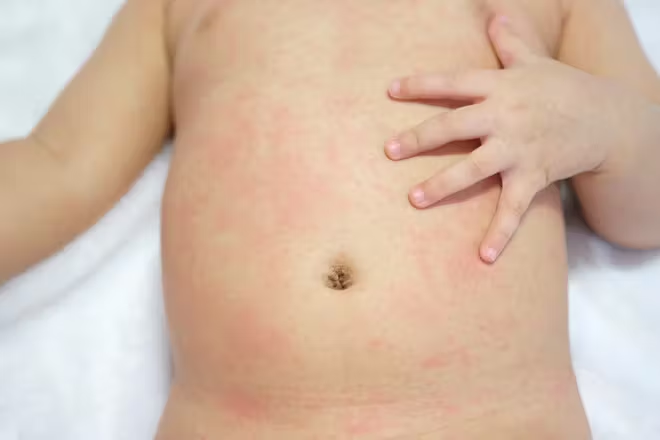As the debate rages on whether to vaccinate children, we bring you the latest and best research that proves it's better to vaccinate your child than not. Plus, does the MMR vaccine cause autism? Will the nasal spray give my child the flu? We answer your questions, address the rumours and set the safety record straight about all things to do with jabs and immunisations.
As parents, we'd do anything to protect our children, especially if it means stopping them from getting ill.
That's why we're so lucky in the UK to be able to immunise our little ones for free against illnesses and diseases that can range from unpleasant to fatal.
The NHS vaccination programme starts when your baby is 8 weeks old – or sometimes younger if you live in an area that recommends an early vaccination against tuberculosis – and continues into their teenage years.
FREE NEWBORN NAPPIES
This is a very good thing, as the NHS points out that vaccines save up to 3 million lives a year worldwide.
While there's no doubt that the first newborn vaccination appointment can be traumatic, it can also trigger some major concerns. What exactly is in the vaccination, for example? Or how do I know if it's safe to give my baby?
While questioning the safety and long-term effects of vaccinations is perfectly normal, finding the answers and reassurance quickly is a must to prevent holding up your baby's first set of vaccinations.
To help, we've collated all the answers to your key questions, so that you can head off to your baby's appointment, red book in hand, safe in the knowledge that you're giving them the best possible start in life, and confident that you're fully informed.
If there's one thing the coronavirus pandemic has taught us, it's how scary it is to live in a world without just one vaccine.
Are vaccines safe?
The Vaccine Knowledge Project is a source of independent information about vaccines and infectious diseases.
Managed by the Oxford Vaccine Group , an academic research group at Oxford University , it aims to provide the latest information and content to 'help people make informed decisions about vaccine issues'.
It says: 'Like everything else in life, vaccines are not completely risk-free.
'However in the case of all the vaccines used in the current UK routine schedule, the overwhelming evidence is that vaccinating is safer than not vaccinating .'
The NHS also explains the rigorous testing that vaccines have had before your child will be given it.
It says:
'Vaccines have to be thoroughly tested for safety before they're made routinely available.'
Even once vaccines are on the market, the testing continues, the NHS explains:
'Each vaccine's safety is continually monitored, even after it's been introduced. This is because not all side effects are picked up during the vaccine's development, especially if they're very rare.'
Who makes sure vaccines are safe?
Before a vaccine is considered safe there are at least eight different stages of testing. These include brainstorming, testing in laboratories, development, trials and studies.
For modern-day vaccines, such as the Meningitis B jab , it can take at least 20 years to develop before being made available, either privately or on the NHS.
That said, as shown by the swift development of the COVID vaccines in the face of the global pandemic, modern technology has advanced to a stage where urgent vaccines can be produced on much shorter timescales, while still being rigorously tested. It also helped that there was a lot of funding available to make it happen as quickly as possible!
Each vaccine has to meet strict criteria and regulations from worldwide organisations.
Then there are further requirements, explains The Vaccine Knowledge Project:
'In addition, for trials in the UK, the vaccine and the trial must receive individual approval from the Medicines and Healthcare products Regulatory Agency (MHRA) , while the trial itself must be approved by the following authorities:
- an NHS Research Ethics Committee
- the local NHS Research and Development office
- the Health and Safety Executive (HSE) .'
Once the vaccines are in use, the MHRA continues to monitor them closely.
The Vaccine Knowledge Project explains:
'Although vaccines undergo rigorous testing before they are licensed for use in the UK, it is important that the safety of vaccines is monitored on an ongoing basis, as with all licensed drugs.
'In the UK this is undertaken by the Medicines and Healthcare products Regulatory Agency (MHRA).'
How do vaccines work?
Most vaccines work by injecting a dead or weakened form of the disease into your body, which your immune system is able to learn to fight without the risk of actually getting sick from it. Vaccines train your body to be able to fight diseases if you come across them later in life.
According to the NHS, 'Vaccines work by making us produce antibodies to fight disease without actually infecting us with the disease.'
That way, if we come into contact with an illness or disease, our 'immune system will recognise it and immediately produce the antibodies they need to fight it,' it says.
Some antibodies get passed across the placenta from mum to baby during pregnancy. This enables newborn babies to be born with some protection against diseases such as measles, mumps, rubella and whooping cough in the first few weeks of their life (as long as mum has been immunised against these).
However, it's only temporary, lasting weeks or a year, maximum, which is why it's important for babies to have their own vaccinations to offer long-term protection.
What ingredients are in vaccines?
'The main active ingredient of any vaccine is the disease-causing virus, bacteria or toxin' explains the NHS.
Depending on which vaccine you have, the virus will either be live or inactive. MMR and the nasal flu spray are examples of live vaccines, whereas whooping cough and polio are inactive.
Both work 'by stimulating the immune system so it thinks it's being attacked by the active part of the vaccine,' says the NHS.
'Your body responds by producing antibodies that stay in your system to protect you in the future.'
As well as the main ingredient in your vaccine – the part that makes it work – there are other ingredients in your jab.
These include:
- adjuvants or enhancers – to make the vaccine more effective
- stabilisers – to stop the vaccine deteriorating when it is exposed to changes in the environment, such as light and temperature
- preservatives – to increase the vaccine's shelf life.
These are nothing to be concerned about. In fact, according to the NHS, these added components 'are needed to make the final vaccine as safe and effective as possible.'
Need advice?
Our health visitors and nursery nurses are online Monday to Friday evenings to answer your queries on feeding, sleep and child health.
Hopefully we've offered tons of reassurance over the safety and necessity of having your child vaccinated and protected against diseases.
Now on to some of those myths and rumours that just won't go away. We get to the bottom of where they came from in the first place and what the latest, safest expert advice is to help put your mind at rest.
Keep reading to find out the truth about vaccinations, despite what else you may have heard ...
Is the MMR vaccine linked to autism?
The answer is no .
To understand why this myth continues to plague the Internet, social media and our very own chat Forum , you need to understand where it came from.
In 1998, the year the MMR was first rolled out, a British doctor called Andrew Wakefield believed he'd found some evidence of a link between the two and published his 'findings' in The Lancet medical journal.
However, after an investigation by the UK's General Medical Council into the so-called evidence, Andrew Wakefield was found guilty of misconduct, dishonesty and unethical behaviour in 2010.
He was struck off, meaning he was no longer allowed to practise medicine, and his 'evidence' was discredited .
Sadly, mud sticks.
What happened decades ago still makes parents question whether to give their child the MMR vaccine, or even whether to vaccinate their child at all.
However, studies continue to disprove Wakefield's theory.
Indeed, the Vaccine Knowledge Project (independent research carried out by Oxford University's Oxford Vaccine Group ) says on its website:
'The original research which suggested a link between the MMR vaccine and autism has now been discredited.
'The National Autistic Society has issued a statement stating that the weight of evidence points to the fact that "there is no statistically significant link between the MMR vaccine and autism".
'An analysis of studies involving over 1 million children found no link between vaccination and autism development in children.'
However, the scale of the problem created by the fears surrounding MMR remains huge: the latest NHS figures for England reveal that only 89.2% of children had the MMR vaccine (in 2021/22) – that means more than one in every 10 children is NOT being vaccinated. And the number of children being vaccinated is falling every year.
Sadly this is putting newborns' and vulnerable people's health at risk, as well as their own. It's also increasing the pressure on our already overburdened NHS, forcing them to treat serious diseases that could otherwise have been avoided.
Not being vaccinated means you're relying on something called 'herd immunity' whereby enough of the population is vaccinated, making it unlikely you'll catch the disease.
However, for herd immunity to work, it requires at least 90-95% of the country to be vaccinated – and even then it should be reserved for people who can't be vaccinated, rather than who simply refuse. Last year, MMR vaccination rates in the UK dropped below this level for the first time.
Read more about herd immunity below.
Find out more about measles and the MMR jab here.
Is it possible to have a single MMR jab instead of the combined one?
The NHS doesn't recommend single measles, mumps or rubella vaccines, as there is no evidence to support their use or to suggest that they are safer than MMR .
Having single vaccines could also put your child at risk of catching measles, mumps or rubella in the time between the doses of each of the vaccines.
If your child were to have them done separately, you'd need to leave several weeks or months between each one rather than having them done within the recommended timescale.
Here's what the NHS says:
' The delay between the 6 separate injections required could put more children at risk of developing measles, mumps or rubella , as well as increase the risk of side effects.
'There are currently no licensed single vaccines for measles or mumps in the UK, which means the single vaccines available haven't been quality checked to make sure they're safe and effective .'
Why do I need to vaccinate my child if everyone else is vaccinated?
Assuming that your child won't get sick or ill if most other people are protected against diseases such as measles, mumps and rubella - among others - is a risky business.
Known as herd immunity, or herd protection, you're banking on enough people having immunity to diseases that it makes it very difficult for them to appear or spread within your community.
However, for herd immunity to work, a large proportion of the population needs to be vaccinated - 90-95%, as mentioned above.
And even then, health experts say it should only be used to help protect vulnerable groups who are too young or unwell to be vaccinated. These include:
- newborn babies
- elderly people
- people who are having chemotherapy
- people with a weakened immune system.
Remember: not all illnesses are spread by people. Tetanus, for example, exists in dirt, so herd immunity won't work to protect you from catching it.
According to Dr Manish Sadarangani , Clinical Lecturer and Honorary Consultant in Paediatric Infectious Diseases and Immunology at The Children’s Hospital in Oxford, vaccination is your best form of protection:
'The best way to protect someone against a disease is to vaccinate them directly, rather than rely on ‘indirect’ protection through herd immunity .
'If someone who is unvaccinated does meet the germ responsible for that disease they will be completely susceptible.
'There will always be some children who cannot be vaccinated for medical reasons – most commonly because they are too young or because they have a problem with their immune system.
'It doesn’t take much of a drop in the number of people vaccinated in a population for herd immunity to be less effective and this isn’t then a reliable way of protecting a child.'
Do vaccines contain mercury?
In the late 1990s, concerns were raised about the use of Thiomersal (a preservative containing tiny amounts of mercury) in vaccines, leading to anti-vaxxers wrongly concluding that it caused autism.
As a precaution, Thiomersal was removed from most vaccines.
The Vaccine Knowledge Project states that Thiomersal (a preservative containing tiny amounts of mercury) was 'removed from UK vaccines between 2003 and 2005, and is no longer found in any of the childhood or adult vaccines routinely used in the UK.'
Prior to being phased out, it was never used in the MMR vaccination.
Since 2005, Thiomersal has only been used in certain non-routine jabs such as hepatitis B and Swine Flu (2009/10 and 2010/11).
The Vaccine Knowledge Project states that ' it is not present in any of the annual flu vaccines currently in use in the UK .'
Does the flu vaccine give you the flu?
No. The flu vaccine is not a live vaccine, therefore it cannot give you the flu.
Here's what the NHS says:
'The injected flu vaccine given to adults contains inactivated flu viruses, so it can't give you flu.
'Your arm may feel a bit sore where you were injected, and some people get a slight temperature and aching muscles for a couple of days afterwards. Other reactions are very rare.'
Children are given the same vaccine but via a nasal spray, which works quickly and just as effectively, but without the pain of using a needle.
So whether you or your child have the flu jab or flu nasal spray, it will not give you the flu.
There may be cold-like symptoms as a side effect, such as a runny nose, but nothing like having actual flu, NHS paediatric doctor, Dr Ranj Singh told Netmums:
'You may get some side effects from it, but they will be nowhere near as serious as having flu itself which we know can land you in hospital with complications and possibly even worse.’
Read more about why Dr Ranj says your child should definitely have the nasal flu spray when it's offered here .
Can the coronavirus vaccine give you coronavirus?
Again, the answer is no . These vaccines are made using a different process than live vaccines, and so you and your children cannot catch coronavirus from it .
The NHS is now offering COVID vaccinations to all children between 12 and 15 years old, and to some kids between the ages of 5 and 11.
Find out more about the COVID vaccine here.
Can you have a vaccination when you're unwell?
If you're tempted to cancel your child's immunisation appointment when they're unwell, don't.
According to The Vaccine Knowledge Project, 'It is rarely necessary to delay immunisation, even if a child is not well.'
It adds:
'It is safe to get vaccinated in all these situations:
- mild illness without fever, e.g. a cold
- asthma, eczema or hay fever
- treatment with antibiotics
- contact with an infectious disease
- history of febrile convulsions (fits caused by fever) or epilepsy
- premature birth
- being under a certain weight
- family history of adverse reactions following immunisation.'
The only time it's a good idea to postpone the appointment is if your child has a fever.
The Vaccine Knowledge Project explains:
'If someone is very unwell with a high temperature, it is a good idea to put off vaccination until they have fully recovered. This is so that symptoms of the illness do not get confused with a reaction to the vaccine.'
Remember that reactions to vaccines are rare.
'While all vaccines have the potential to cause side effects in some people, the reality is that most tend to be mild and don't last longer than a few days. Some people don't get any side effects at all,' explain the NHS.
Why isn't the chickenpox vaccine available on the NHS?
Although chickenpox vaccinations are part of the routine immunisation schedule in the United States and Germany, the UK's immunisation body has decided against universal vaccination of children against chickenpox.
This is due to the cost as well as fears that it could increase shingles among adults:
'If a childhood chickenpox vaccination programme was introduced,' explains the NHS , 'people would not catch chickenpox as children because the infection would no longer circulate in areas where the majority of children had been vaccinated.
'This would leave unvaccinated children susceptible to contracting chickenpox as adults, when they are more likely to develop a more severe infection or a secondary complication, or in pregnancy, when there is a risk of the infection harming the baby.
'We could also see a significant increase in cases of shingles in adults. Being exposed to chickenpox as an adult – for example, through contact with infected children – boosts your immunity to shingles.
'If you vaccinate children against chickenpox, you lose this natural boosting, so immunity in adults will drop and more shingles cases will occur.'
Despite this, a recent study has suggested that nearly 75% of parents in the UK want the NHS to start providing chickenpox vaccines as part of the schedule.
The NHS only offers the chickenpox vaccine to children and adults who are particularly vulnerable to complications of the illness, such as those with a weakened immune system.
It is also given to those in contact with people at risk, for example, the brothers and sisters of a child with leukaemia, or a child whose parent is undergoing chemotherapy.
If you want to get your child vaccinated, you can get it done privately. This has to be done over the age of 12 months and is likely to cost around £70 per dose (for a two-dose course).
It is very safe and is 98% effective in children.
Does the vitamin K newborn injection cause leukaemia?
Although your baby's immunisation schedule begins at 8 weeks old, you may already have consented to their first injection by the time you've had your first post-labour cup of tea and toast: the vitamin K injection is offered minutes after your baby is born, as a single jab in the thigh.
It's recommended for newborns as it helps prevent a condition called Haemorrhagic Disease of the Newborn (HDN), also known as Vitamin K Deficiency Bleeding (VKDB).
This can cause mild symptoms such as bruising or bleeding, but can also cause life-threatening internal bleeding, too.
The vitamin K injection does NOT cause leukaemia, despite what online rumours may suggest.
Research in 2003 by the UK Children's Cancer Study Group (now named the Children's Cancer and Leukaemia Group ) addresses this and reveals there is no link to leukaemia or any other cancers.
It says:
'There is no convincing evidence that neonatal vitamin K administration, irrespective of the route by which it is given, influences the risk of children developing leukaemia or any other cancer.'
The NHS has also addressed this 'link':
'A concern was expressed in the early 1990s that there was a link between vitamin K supplements and leukaemia or other cancers.
'A careful review of data from the UK Children's Cancer Study Group in 2003 found no evidence to support this.'
If you're really against giving it via injection, your midwife may be able to give it orally instead. It requires three (oral) doses to get the same effectiveness as the injection.
I was anti-vaccinations but I've changed my mind – is it too late to vaccinate my children?
No, simply call your GP and book them in as soon as possible.
Which vaccinations are safe to have with an egg allergy?
Some vaccines contain small amounts of egg protein because in order to create the active ingredient, the virus has to be grown and reproduced. For some vaccines, this will be done using cells found in hens' eggs .
So, if you or your child has a known allergy, always remind your GP before having any vaccinations.
To date, there are only two main vaccines that are linked to eggs.
These are:
- MMR
- Flu
However, having an egg allergy doesn't necessarily mean skipping these vaccinations.
According to the NHS :
'MMR vaccine is grown on cells from chick embryos, which is not the same as hens' eggs. This means it does not trigger an allergic reaction.
'Children and adults with a severe egg allergy can safely receive the MMR vaccine.'
With regards to the flu jab, the NHS says:
'Flu vaccine is grown on hens' eggs and potentially may trigger an allergic reaction in people with an egg allergy.
'Children and adults with an egg allergy are therefore advised to have either an egg-free inactivated flu vaccine or a vaccine with a very low egg protein (ovalbumin) content.
'The live nasal spray flu vaccine given to children has a very low egg protein content. It can be safely given to children with an egg allergy.
'Children and adults who have previously had a very severe allergic reaction to eggs may be advised to have their flu vaccine in a hospital.'
Find out more about your child's nasal flu vaccine here.
The COVID-19 vaccine doesn't contain egg, so it is safe for those with egg allergies.
Is it safe to have vaccinations during pregnancy?
It depends on which vaccinations – some are safe but some aren't.
Whooping cough
The whooping cough jab is considered safe and essential during pregnancy, as it offers your newborn protection against this potentially fatal disease in its first few weeks of life.
Flu
The flu jab is also safe during pregnancy (during flu season) and is recommended for the following reasons, according to the NHS:
'You should have the vaccine no matter what stage of pregnancy you're at. If you're pregnant, you could get very ill if you get flu, which could also be bad for your baby.
'Having the vaccine can also protect your baby against flu after they're born and during the early months of life.'
MMR
The MMR jab isn't recommended during pregnancy because it contains a live virus.
COVID-19
The COVID vaccine is now considered safe during pregnancy, and indeed is recommended by the UK Government as pregnant women have been shown to have a higher risk of having a severe reaction to the disease:
'You are being offered the vaccine to protect you and your baby. In the UK, over 250,000 women have been vaccinated before giving birth, mainly with Pfizer and Moderna vaccines.
'These vaccines have a good safety profile in pregnant women and their babies. COVID-19 vaccines do not contain live coronavirus and cannot infect a pregnant woman or her unborn baby in the womb.'
Find out the latest advice regarding vaccinations during pregnancy here .
Are vaccinations mandatory?
Vaccinations are still a parent's choice in the UK, which is why it's essential to keep your child up to date and remember that vaccinations:
- eradicate diseases
- save lives
- avoid putting your child in hospital
Other countries have different policies. In the USA, evidence of vaccinations must be given in order to attend preschools and start school.
Australia has introduced a 'no jab, no pay' policy where parents lose money off their tax benefits for not keeping their kids up to date with immunisations.
In Europe, France and Italy have made 11 childhood vaccinations compulsory in order to combat the low uptake of vaccinations. With cases of measles spreading across Europe, other countries could follow suit.
'It may be tempting to say "no" to vaccination and "leave it to nature",' says the NHS , 'but deciding not to vaccinate your child puts them at risk of catching a range of potentially serious, even fatal, diseases .
'In reality, having a vaccination is much safer than not having one .'
Hopefully, these answers will mean you will get your child vaccinated, safe in the knowledge that being vaccinated is much safer than being left unprotected .
Talking to your GP, nurse or midwife before having vaccinations or vaccinating your child is always a good idea if there's anything you're uncertain of.
Be aware that there will always be anti-vaxxers amongst any group of non-health professionals that you ask for advice - for example, parents at playgroup, or a parent in our Forum – something we can't change, other than helping to educate them and providing the latest research and expert opinions in favour of vaccinations .
As with anything that impacts your child's health, always base your decision to vaccinate on genuine evidence, not urban myth and rumour.
And of course, now you know the truth about vaccinations, make sure you spread the news and chat with others who still aren't sure in our chat Forum !
Related stories
Your child's immunisation schedule explained
CHAT: Australia fines parents for not vaccinating – we should do it too








